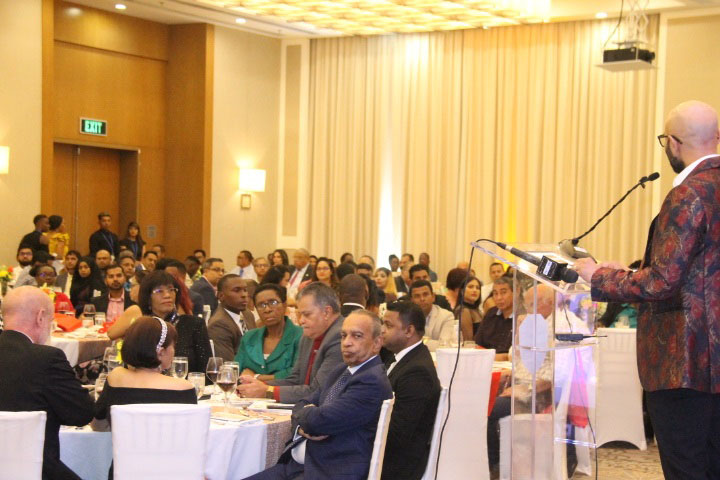In the face of expected resources from oil and gas, the Georgetown Chamber of Commerce and Industry (GCCI) has developed a strategic policy plan for Guyana’s development and is pleading with politicians to implement it whether the government changes or not.
As next year’s general and regional elections loom, the organisation is also hoping that voters focus on similar policy programmes planned by political parties and not vote along racial lines or based on party loyalty.
“The GCCI believes that in order to prepare our country for a new era in its history, we need to have a single all encompassing, nationally bought into development plan, not a plan that will be thrown out at successive elections,” GCCI President Nicholas Deygoo-Boyer on Thursday evening told the organisation’s 130th anniversary gala dinner and awards, held at the Marriott Hotel.
“This transformative plan must address the structural issues in our economy that will allow us to be a shining example for our region and for the world in the case of how small states deal with windfall natural resource exploitation,” he added, while making reference to a Rystad Energy revenue forecast which projects government revenue from the 14 discoveries in the Stabroek Block to be above US$120 billion.
Deygoo-Boyer said that the GCCI has formulated its own plan for the holistic development of Guyana, which it will give to this nation’s political leaders. He said that the local private sector business body has spent time and research to formulate the plan, which it believes Guyana needs for sustained future development.
“We have come up with a ten-point plan that we believe will address the major structural issues in our economy,” he said, while identifying the areas as energy, local content legislation and the Sovereign Wealth Fund, infrastructure, healthcare, education, governance, security, trade & taxation, diversified and value added economy, and labour.
As it pertains to energy, he said that the GCCI has a plan that would see a reduction in energy costs, a more reliable supply and the implementation of power purchasing agreement legislation to allow for purchase from independent power producers.
On local content, Deygoo-Boyer said that Guyana needs to aggressively build capacity and the GCCI plan speaks to the implementation of a local content policy and related legislation while proposing the formation of a Local Content Commission. Already, he said, the GCCI has engaged multiple levels of government and policymakers on legislation and regulations that impact the petroleum industry.
“The Chamber has also been at the forefront of the conversation regarding local content. In August, the Chamber hosted a Local Content Forum at Duke Lodge. Feedback received from attendees and the Chamber’s membership was compiled and used to prepare the Chamber’s Position Paper on Guyana’s Petroleum Sector Local Content Policy, which was recently submitted to the Department of Energy as a response to a request for commentary on the 3rd Draft of the Local Content Policy,” he informed.
With regards to the revenue received from oil and gas, the GCCI said that there needs to be a Sovereign Wealth Fund with stronger controls for how funds are allocated and transparent institutions and policies through which the funds are spent.
‘A better way forward’
Guyana’s current political atmosphere was also reflected upon as Deygoo-Boyer said that the Guyana Elections Commission (GECOM)’s failure to be prepared for circumstances as provided for in the Constitution, such as the no-confidence motion, is a negative reflection of the country.
“An election that should have happened in March 2019, will now take place in March 2020 due to the failure of preparation of the Guyana Elections Commission. This cannot be overlooked. As leaders in the business world, if any unit we ran failed its mandate, there would have been serious repercussions and investigations launched into why there was a breakdown in the unit not being able to deliver upon its mandated function within the prescribed time; at GECOM it still continues to be a mystery as to how the organisation failed in its mandate to be prepared for a March 2019 election, having known that an early one would be called after the no-confidence motion,” he said.
“Unfortunately, that type of failure has to be laid at the feet of those in captaincy of the organisation; such as its Chief Executive Officer and the commission. Given that the saga on house-to-house registration exposed how flawed the current composition of [GECOM] is, Guyanese need a better way forward, and not to be held hostage to the battle for power,” he added.
For the 2020 general elections, the GCCI encouraged that a code of





